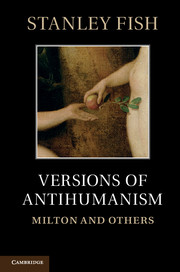Book contents
- Frontmatter
- Contents
- Acknowledgments
- Introduction: intention, historicism and interpretation
- Part I Milton
- Chapter 1 The Brenzel lectures
- Chapter 2 To the pure all things are pure
- Chapter 3 “There is nothing he cannot ask”
- Chapter 4 Why Milton matters; or, against historicism
- Chapter 5 Milton in popular culture
- Chapter 6 How the reviews work
- Chapter 7 The new Milton criticism
- Part II Early modern literature
- Index
Chapter 7 - The new Milton criticism
Published online by Cambridge University Press: 05 May 2012
- Frontmatter
- Contents
- Acknowledgments
- Introduction: intention, historicism and interpretation
- Part I Milton
- Chapter 1 The Brenzel lectures
- Chapter 2 To the pure all things are pure
- Chapter 3 “There is nothing he cannot ask”
- Chapter 4 Why Milton matters; or, against historicism
- Chapter 5 Milton in popular culture
- Chapter 6 How the reviews work
- Chapter 7 The new Milton criticism
- Part II Early modern literature
- Index
Summary
If I were king, I would lay it down as a rule that no Miltonist could do theory, except for me. The reason is that Miltonists who do theory almost always make what I call the “theory mistake”: They announce some grand theoretical truth (often a dubious one) and then claim to derive from it an interpretive conclusion, usually the conclusion that Milton is of the Devil's party with or without knowing it; or the conclusion that while the official orthodoxy of Paradise Lost tells one story – of disobedience, loss and possible redemption – the energies of the verse tell quite another story and it is the better one; or the conclusion that Milton has for too long been captured by an orthodox establishment that either ignores or aestheticizes or stigmatizes the radical forces at play in his work; or the conclusion that Milton's poetry and prose tell no single truth, but problematize issues of truth and fact to the point where the only message being sent is the message of instability, mutability and indeterminacy; or the conclusion that in a poem that celebrates freedom and condemns tyranny, the strongest image of tyranny is the heaven presided over by a God who demands mindless obedience for no good reason. In this essay I will not be considering these conclusions (which I find unpersuasive), but the argumentative logic by which they are supposedly reached.
Those who reach these conclusions and make these arguments are described or describe themselves as the forerunners of a “new Milton criticism” or as “guerilla Miltonists” (Herman, Destabilizing Milton: Paradise Lost and the Poetics of Incertitude [Macmillan, 2008], 20), a band of brave brothers and sisters thought to include, among others, Michael Bryson, Stephen Dobranski, Neil Forsyth, Peter Herman, William Kolbrener, Ronald Levao, Catherine Gimelli Martin, Lucy Newlin, David Norbrook, William Poole, John Rogers, John Rumrich, Elizabeth Sauer, Regina Schwartz, Jeffrey Shoulson, Victoria Silver, Richard Streier and Shari Zimmerman. More than honorable mention is often made of Joseph Wittreich, John Shawcross, Christopher Hill, Dennis Saurat, A.J.A. Waldock, John Carey and John Peter, while fulsome tribute is paid to William Empson (who certainly deserves it). Michael Lieb is often referenced as someone who should be of the New Miltonist party, given his many analyses of a wrathful God who inspires dread and fear, but Lieb, it is lamented, finally remains within the conservative fold.
- Type
- Chapter
- Information
- Versions of AntihumanismMilton and Others, pp. 131 - 144Publisher: Cambridge University PressPrint publication year: 2012



